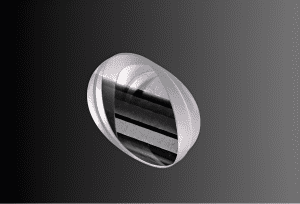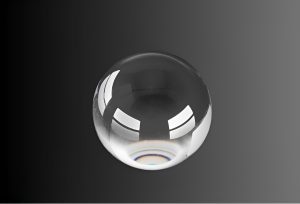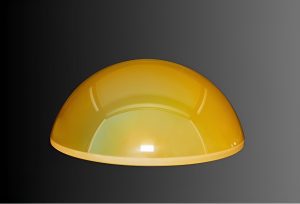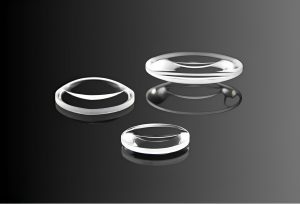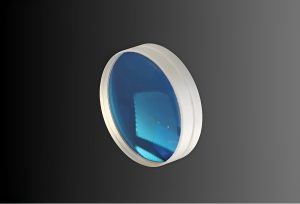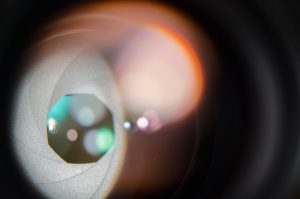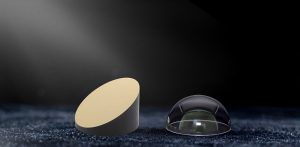Spherical Lenses
Spherical lenses, often referred to as singlets, are optical components with curved surfaces designed for the convergence or divergence of light rays. These lenses are widely used in various imaging applications across a range of optical systems. When selecting a lens, several factors need to be considered, including the conjugate ratio, lens shape, radius of curvature, lens material, transmission, wavefront distortion, scattered light, and types of coating. Avantier specializes in manufacturing high precision custom spherical optics in three main shapes: plano-convex, double convex, and plano-concave lenses.

Types of Lens
Plano-Convex Lenses
Plano-convex and double convex lenses are categorized as positive lenses, which means they have positive focal lengths. Plano-convex lenses have one flat surface and one spherical surface, making them suitable for applications involving infinite or near-infinite conjugates, light collimation, and monochromatic illumination. These lenses minimize spherical aberration up to a conjugate ratio of approximately 5:1 and are often the preferred choice for demanding applications. In an ideal setup, the curved surface should face the infinite conjugate or the largest object distance.
Double Convex Lenses
Double convex lenses feature two convex surfaces with equal radii and exhibit both horizontal and vertical symmetry. They are well-suited for forming images at close conjugate distances and for image relays. At 1:1 magnification, when the object and image distances are equal, the lens’s symmetry cancels out coma, distortion, and chromatic aberration while minimizing spherical aberration. Double convex lenses are recommended for applications where the conjugate ratios range between 5:1 and 1:5.
Magnifying glasses commonly utilize double convex lenses. When the object distance is close, the rays are bent towards the focal point at the center of the lens, resulting in a virtual image appearing much larger than the real image.
Plano-Concave Lenses
Plano-concave lenses have negative focal lengths and are suitable for situations where the light rays need to diverge after passing through the lens. They are used in light projection, beam expansion, or when expanding the focal length of an optical system is desired. When used in conjunction with other lenses, the negative spherical aberration of plano-concave lenses can be utilized to counterbalance the aberrations caused by convex lenses. These lenses have one flat surface and one concave surface, and in most cases, the curved surface should face the most significant object distance. However, in high-energy lasers, the flat surface should be directed towards the infinite conjugate or most considerable object distance to avoid the possibility of a virtual focus.
Material Selection and Surface Quality
Surface quality and material selection are important considerations when choosing spherical lenses. Avantier offers lenses in a wide range of substrates, including BK7, Fused Silica, N-SF11, Zinc Selenide, Calcium Fluoride, and Silicon.
- Material Selection for Specific Applications
The choice of material largely determines the applicable wavelength range of the optical system, and custom spherical lenses can be tailored for infrared, visible, and ultraviolet applications. For infrared applications in defense, security, environmental, medical, or agricultural fields, ZnSe, ZnS, BaF2, CaF2, MgF2, or germanium substrates are commonly selected. For visible wavelengths, Schott, Ohara, CDGM, or Corning Fused Silica are recommended. - Surface Quality Ratings
Surface quality ratings are used to assess the smoothness of a lens surface, ensuring that the spherical lenses meet the required wavefront and low-scatter specifications. This aspect is particularly crucial for laser applications as surface imperfections can initiate laser-induced damage. The MIL-PRF-13830B rating system is commonly used in spherical lens manufacturing and provides scratch and dig numbers in an x-y format. Scratches are assigned a number from 10 to 80, with a higher number indicating greater brightness of allowable scratches. Dig numbers represent the diameter of the largest permissible dig in 1/100th of millimeters. The total number of digs should not exceed the diameter divided by 20, and the sum of all scratch lengths with the specified scratch number should not exceed ¼ of the optic’s diameter. The standard quality for most optical applications is 40-20, while precision laser applications require a surface quality of 20-10.
Custom Spherical Lenses for Specific Requirements
In addition to the standard lens options, customization is available for spherical lenses to meet specific requirements. Avantier offers custom spherical lenses tailored to individual needs. This customization includes the ability to select materials, coatings, and surface qualities based on the desired application. Whether it’s infrared, visible, or ultraviolet applications, the company provides a wide range of substrate options such as BK7, Fused Silica, N-SF11, Zinc Selenide, Calcium Fluoride, and Silicon.
Furthermore, the lenses can be precisely manufactured to meet specific wavefront and low-scatter requirements. This level of customization is particularly crucial for demanding applications like laser systems, where the slightest imperfection can have a significant impact. By offering tailored solutions and the ability to fine-tune parameters such as surface quality, coatings, and material selection, Avantier ensures that customers receive spherical lenses that are optimized for their unique optical setups. Contact us today if you’d like to discuss a custom order or your next project.
WE CAN HELP YOU!
Contact us NOW for sales & expert advice.


